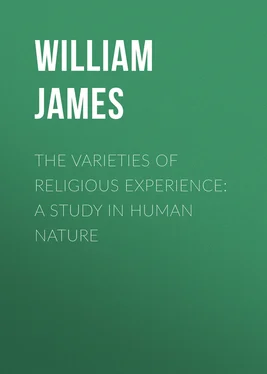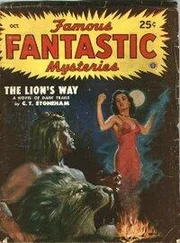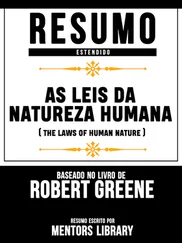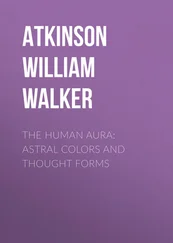William James - The Varieties of Religious Experience - A Study in Human Nature
Здесь есть возможность читать онлайн «William James - The Varieties of Religious Experience - A Study in Human Nature» — ознакомительный отрывок электронной книги совершенно бесплатно, а после прочтения отрывка купить полную версию. В некоторых случаях можно слушать аудио, скачать через торрент в формате fb2 и присутствует краткое содержание. Жанр: foreign_prose, foreign_religion, Философия, foreign_psychology, foreign_antique, на английском языке. Описание произведения, (предисловие) а так же отзывы посетителей доступны на портале библиотеки ЛибКат.
- Название:The Varieties of Religious Experience: A Study in Human Nature
- Автор:
- Жанр:
- Год:неизвестен
- ISBN:нет данных
- Рейтинг книги:4 / 5. Голосов: 1
-
Избранное:Добавить в избранное
- Отзывы:
-
Ваша оценка:
- 80
- 1
- 2
- 3
- 4
- 5
The Varieties of Religious Experience: A Study in Human Nature: краткое содержание, описание и аннотация
Предлагаем к чтению аннотацию, описание, краткое содержание или предисловие (зависит от того, что написал сам автор книги «The Varieties of Religious Experience: A Study in Human Nature»). Если вы не нашли необходимую информацию о книге — напишите в комментариях, мы постараемся отыскать её.
The Varieties of Religious Experience: A Study in Human Nature — читать онлайн ознакомительный отрывок
Ниже представлен текст книги, разбитый по страницам. Система сохранения места последней прочитанной страницы, позволяет с удобством читать онлайн бесплатно книгу «The Varieties of Religious Experience: A Study in Human Nature», без необходимости каждый раз заново искать на чём Вы остановились. Поставьте закладку, и сможете в любой момент перейти на страницу, на которой закончили чтение.
Интервал:
Закладка:
In other words, not its origin, but the way in which it works on the whole , is Dr. Maudsley's final test of a belief. This is our own empiricist criterion; and this criterion the stoutest insisters on supernatural origin have also been forced to use in the end. Among the visions and messages some have always been too patently silly, among the trances and convulsive seizures some have been too fruitless for conduct and character, to pass themselves off as significant, still less as divine. In the history of Christian mysticism the problem how to discriminate between such messages and experiences as were really divine miracles, and such others as the demon in his malice was able to counterfeit, thus making the religious person twofold more the child of hell he was before, has always been a difficult one to solve, needing all the sagacity and experience of the best directors of conscience. In the end it had to come to our empiricist criterion: By their fruits ye shall know them, not by their roots, Jonathan Edwards's Treatise on Religious Affections is an elaborate working out of this thesis. The roots of a man's virtue are inaccessible to us. No appearances whatever are infallible proofs of grace. Our practice is the only sure evidence, even to ourselves, that we are genuinely Christians.
“In forming a judgment of ourselves now,” Edwards writes, “we should certainly adopt that evidence which our supreme Judge will chiefly make use of when we come to stand before him at the last day.... There is not one grace of the Spirit of God, of the existence of which, in any professor of religion, Christian practice is not the most decisive evidence.... The degree in which our experience is productive of practice shows the degree in which our experience is spiritual and divine.”
Catholic writers are equally emphatic. The good dispositions which a vision, or voice, or other apparent heavenly favor leave behind them are the only marks by which we may be sure they are not possible deceptions of the tempter. Says Saint Teresa:—
“Like imperfect sleep which, instead of giving more strength to the head, doth but leave it the more exhausted, the result of mere operations of the imagination is but to weaken the soul. Instead of nourishment and energy she reaps only lassitude and disgust: whereas a genuine heavenly vision yields to her a harvest of ineffable spiritual riches, and an admirable renewal of bodily strength. I alleged these reasons to those who so often accused my visions of being the work of the enemy of mankind and the sport of my imagination.... I showed them the jewels which the divine hand had left with me:—they were my actual dispositions. All those who knew me saw that I was changed; my confessor bore witness to the fact; this improvement, palpable in all respects, far from being hidden, was brilliantly evident to all men. As for myself, it was impossible to believe that if the demon were its author, he could have used, in order to lose me and lead me to hell, an expedient so contrary to his own interests as that of uprooting my vices, and filling me with masculine courage and other virtues instead, for I saw clearly that a single one of these visions was enough to enrich me with all that wealth.” 6
I fear I may have made a longer excursus than was necessary, and that fewer words would have dispelled the uneasiness which may have arisen among some of you as I announced my pathological programme. At any rate you must all be ready now to judge the religious life by its results exclusively, and I shall assume that the bugaboo of morbid origin will scandalize your piety no more.
Still, you may ask me, if its results are to be the ground of our final spiritual estimate of a religious phenomenon, why threaten us at all with so much existential study of its conditions? Why not simply leave pathological questions out?
To this I reply in two ways: First, I say, irrepressible curiosity imperiously leads one on; and I say, secondly, that it always leads to a better understanding of a thing's significance to consider its exaggerations and perversions, its equivalents and substitutes and nearest relatives elsewhere. Not that we may thereby swamp the thing in the wholesale condemnation which we pass on its inferior congeners, but rather that we may by contrast ascertain the more precisely in what its merits consist, by learning at the same time to what particular dangers of corruption it may also be exposed.
Insane conditions have this advantage, that they isolate special factors of the mental life, and enable us to inspect them unmasked by their more usual surroundings. They play the part in mental anatomy which the scalpel and the microscope play in the anatomy of the body. To understand a thing rightly we need to see it both out of its environment and in it, and to have acquaintance with the whole range of its variations. The study of hallucinations has in this way been for psychologists the key to their comprehension of normal sensation, that of illusions has been the key to the right comprehension of perception. Morbid impulses and imperative conceptions, “fixed ideas,” so called, have thrown a flood of light on the psychology of the normal will; and obsessions and delusions have performed the same service for that of the normal faculty of belief.
Similarly, the nature of genius has been illuminated by the attempts, of which I already made mention, to class it with psychopathical phenomena. Borderland insanity, crankiness, insane temperament, loss of mental balance, psychopathic degeneration (to use a few of the many synonyms by which it has been called), has certain peculiarities and liabilities which, when combined with a superior quality of intellect in an individual, make it more probable that he will make his mark and affect his age, than if his temperament were less neurotic. There is of course no special affinity between crankiness as such and superior intellect, 7for most psychopaths have feeble intellects, and superior intellects more commonly have normal nervous systems. But the psychopathic temperament, whatever be the intellect with which it finds itself paired, often brings with it ardor and excitability of character. The cranky person has extraordinary emotional susceptibility. He is liable to fixed ideas and obsessions. His conceptions tend to pass immediately into belief and action; and when he gets a new idea, he has no rest till he proclaims it, or in some way “works it off.” “What shall I think of it?” a common person says to himself about a vexed question; but in a “cranky” mind “What must I do about it?” is the form the question tends to take. In the autobiography of that high-souled woman, Mrs. Annie Besant, I read the following passage: “Plenty of people wish well to any good cause, but very few care to exert themselves to help it, and still fewer will risk anything in its support. ‘Some one ought to do it, but why should I?’ is the ever reëchoed phrase of weak-kneed amiability. ‘Some one ought to do it, so why not I?’ is the cry of some earnest servant of man, eagerly forward springing to face some perilous duty. Between these two sentences lie whole centuries of moral evolution.” True enough! and between these two sentences lie also the different destinies of the ordinary sluggard and the psychopathic man. Thus, when a superior intellect and a psychopathic temperament coalesce—as in the endless permutations and combinations of human faculty, they are bound to coalesce often enough—in the same individual, we have the best possible condition for the kind of effective genius that gets into the biographical dictionaries. Such men do not remain mere critics and understanders with their intellect. Their ideas possess them, they inflict them, for better or worse, upon their companions or their age. It is they who get counted when Messrs Lombroso, Nisbet, and others invoke statistics to defend their paradox.
Читать дальшеИнтервал:
Закладка:
Похожие книги на «The Varieties of Religious Experience: A Study in Human Nature»
Представляем Вашему вниманию похожие книги на «The Varieties of Religious Experience: A Study in Human Nature» списком для выбора. Мы отобрали схожую по названию и смыслу литературу в надежде предоставить читателям больше вариантов отыскать новые, интересные, ещё непрочитанные произведения.
Обсуждение, отзывы о книге «The Varieties of Religious Experience: A Study in Human Nature» и просто собственные мнения читателей. Оставьте ваши комментарии, напишите, что Вы думаете о произведении, его смысле или главных героях. Укажите что конкретно понравилось, а что нет, и почему Вы так считаете.












